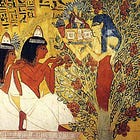Welcome to Planet Ficus. My goal here is to amaze you with stories about the biology, mythology and many values of strangler figs and their kin.
Why fig trees? I think they are the world's most ecologically important, evolutionarily interesting and generally mind-blowing plants on the planet.
Why Planet Ficus? The fig trees (Ficus species) have been around for 80 million years, living alongside the last giant dinosaurs and shaping us and our world ever since. Thanks to a partnership they forged all those millions of years ago, fig trees sustain more species of birds and mammals than any other plants. They are keystone species — disproportionately important to the working of our world.
Why me? I have been learning about these plants for more than 30 years. For my doctorate, I studied dozens of wild fig species and the animals that disperse their seeds in a Bornean rainforest. I also did research on the role fig trees played in restoring life to a volcanic island in Papua New Guinea that an eruption had sterilized.
Years later, I learned about the key roles fig trees played in human evolution, the dawn of civilization and in religions and cultures all across the world. I wrote about all of this in a book: Gods, Wasps and Stranglers. Since I wrote the book, I've learned a lot more.
Planet Ficus is where I will share stories old and new. I will take you to rainforests and deserts, to temples and laboratories and I will show you how the stories of Ficus species and humankind are deeply entwined. For a preview of what kinds of stories I will share, check out the introductory post:
If that sounds interesting, please subscribe, share and check out the book, below.






